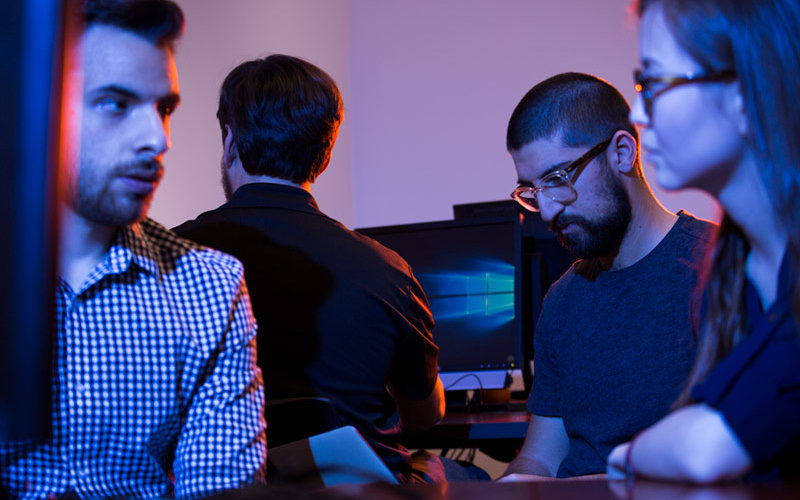
A team of Cal State Fullerton computer science, computer engineering and business students is developing an app to tackle urban challenges for a smart, internet-connected city.
CSUF is one of eight California State University teams competing in this year’s GE Digital CSU Challenge. The competition is designed to spark interest among engineering and computer science talent to develop projects, products, applications and solutions utilizing GE’s Predix cloud-based software technology for the industrial internet.
The GE Challenge culminates with a symposium Sunday, April 29, from 9 a.m.-2:30 p.m. at San Diego Central Library. Teams will present their projects to judges from the city of San Diego and industry, and compete for $25,000 in total prize money, as well as the opportunity to intern at GE Digital.
This year’s challenge focuses on San Diego, which has deployed an “internet of things” platform by placing more than 3,200 “intelligent nodes” on streetlights across the city. San Diego also has launched an open data portal to share data about city operations, public safety, street repairs, public facilities, code enforcement and business licensing.
For the competition, the CSU teams are given real-time data from sensors placed on streetlights throughout downtown San Diego, said Anand Panangadan, CSUF assistant professor of computer science and coordinator of the GE Digital CSU Challenge.
“These sensors can detect pedestrians, traffic, parking, and environmental data such as temperature and humidity,” Panangadan said. “The challenge is to use this live data and other datasets to build a software application to tackle an urban challenge, and in particular, helping San Diego realize their climate action plan of eliminating half of all greenhouse gas emissions in the city and striving for all electricity used in the city to be from renewable sources by 2035.”
The CSUF student team has developed a “microclimate app” to assess air quality and detect such health hazards as algae bloom and acid rain, said team member and computer science major Austin Suarez.
“We’re focusing on the temperature, humidity and pressure sensors,” Suarez added. “With the help of data from these sensors, the application would generate a map at a micro level that will determine areas susceptible to public health concerns. As cities are getting impacted by increases in population, it’s crucial to know more about the air quality and possible health threats.”
For the competition, students learn to build a software application to address a real problem using real-world datasets, Panangadan explained. “Students are encouraged to work in interdisciplinary teams and think not only about the technical aspects of their application, but also about the potential users of their application. Their software idea can have a real impact on the city of San Diego.”
For the students, being in the forefront of this emerging technology gives them a competitive edge in finding jobs after graduation, Suarez added.
“Our society is changing incredibly fast — everything from smart coffee makers to self-driving cars, with millions of devices connecting to the internet every year. Building the foundation of the industrial internet is not only important now, but to how our society will continue to evolve.”
In addition to Suarez, CSUF team members and their majors are: seniors Nara Dashdondog, business administration-operations and supply chain management concentration; Maygan Hooper and Jonathan Moubayed, both computer science; junior Jonathan Schinowsky, computer engineering; and computer science graduate student Shripal Mithun Rawal.